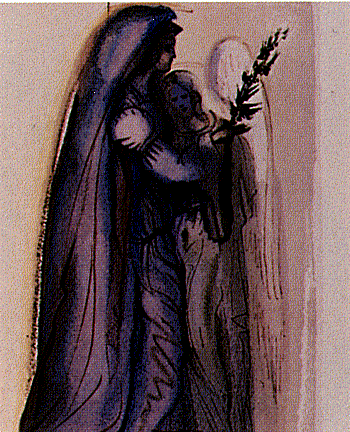Dante's Invocations to the Muses and God

Dante has at least six Invocations to the Muse, Muses, or God. Each of these follows a basic pattern that he varies in a number of ways:
- Each has both a statement of the task or problem of describing a certain scene and a request for help in receiving such a prayer.
- Most also have some kind of praise or reward that will result from the help given.
- As each request to the Muses is made, Dante's invocations grow in their direct awareness of his need for divine inspiration.
They can be understood as working along a continuum:
- As a Christian, Dante conceives of the Muses as effective allegories of his poetic talent, a talent he perceives to be a gift of God. In this sense, even his early invocations to the Muses are also recognition of God's involvement.
- Yet, where his talent can be understood as a space for God to speak to and through him, his final requests also recognize that some things are beyond poetic talent and need God's direct inspiration.
- As some have recognized, this is ironic, because Dante can be construed as claiming that his final visions are a kind of revelation.
View the Pattern in Each Invocation
Inferno 2.1-9
ll. 1-6: Opening description of the journey ahead. In this example, Dante is relatively confident: "the double war/ of the journey and the pity, which memory/ shall set down, nor hesitate, nor err." (4-6).
ll.7-9: Naming of the Muses, "O Muses! O High Genius!"
and description of the resulting praise: "here shall your true nobility be displayed!" (7,9)
Inferno 32.1-11
ll.1-7: The need for poetic skills to describe the lowest levels of hell: "For it is no easy undertaking, I say,/ to describe the bottom of the Universe" (6-7).
ll.8-11: Naming of the Muses, "Ladies of the Heavenly Spring,"
a statement of their former deeds, "who helped Amphion wall Thebes,"
and a statement of the results, "that the word may be the mirror of the thing."
(9-11)
Purgatorio 1.1-12
ll.1-6: Description of the realm of Purgatory to be described. Dante's "indwelling powers raises her sails" in order to finally "grow worthy to ascend to Heaven" (2,5).
By doing this, Dante is implying that poetic work can be a form of purgation and sanctification.
ll.7-12: Naming of the Muses, "sacred Muses, " esp. "sweet Calliope," the muse of epic poetry. (7,9)
a statement of Calliope's former deeds, "whose power the wretched Pierides once felt"(11).
Purgatorio 29.29-42
ll. 29-36: Dante describes the poetic state he is in and the bounty of Eden.
ll.37-42: Naming of the Muses, "Most Holy Virgins," esp. Urania, the Muse of Music.
and the results: "to put in verse things difficult to grasp."
By calling them Virgins, Dante stresses the purity of his poetic calling, and perhaps he also implies that it is a kind of contemplative vocation that serves God's mediators alone in chastity.
Paradisio 1.1-36
ll. 1-12: Accounts the difficulty in describing the beauty of God, yet claims to have seen this glory and wants to recall it.
ll.13-21: Naming of Apollo, the god of poetry and song, who here serves as a symbol of God's own poetic ability.
Dante realizes he must call on both the mountain of the Muses and the Mountain of Apollo, both his own talent and that of God's inspiration.
Recalls Apollo's former acts when he conquered "Marsyas/ that time you drew his body from its sheath" (19-20).
ll.22-36: Hopes that "even the shadow/ of that High Kingdom" will be described and that Dante himself will be given a poetic crown, even if it is the crown of the lesser poet who makes way for a greater one: 'So after me, perhaps, a better voice/ shall raise such prayers" (35-36).
Paradisio 33.55-75
ll. 55-64: Dante finally realizes that his final vision is one beyond human speech, and he offers an epic simile to indict his lack of ability. The experience is like awakening from a dream with only the vaguest details remembered.
ll.66-75: Naming of God, "O Light Supreme,"
and request for divine help, "make Thou my tongue so eloquent it may/ of all Thy glory speak a single clue" (69-70).
The result will be praise and glory for God: "Thou shalt show man more of Thy victory" (75).
